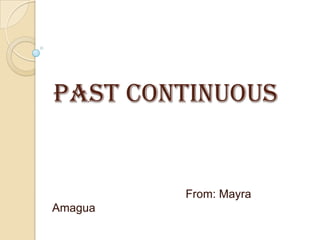Past continuous
•Descargar como PPTX, PDF•
0 recomendaciones•1,106 vistas
Denunciar
Compartir
Denunciar
Compartir

Más contenido relacionado
La actualidad más candente
La actualidad más candente (20)
PERFEKT - Trennbare Verben - Tagesablauf von Paul und Paulinchen

PERFEKT - Trennbare Verben - Tagesablauf von Paul und Paulinchen
Destacado
Destacado (6)
Similar a Past continuous
#learningisfun #englishgrammar Tenses | Past Progressive or Continuous Tense ...

#learningisfun #englishgrammar Tenses | Past Progressive or Continuous Tense ...Prajnaparamita Bhowmik
Similar a Past continuous (12)
#learningisfun #englishgrammar Tenses | Past Progressive or Continuous Tense ...

#learningisfun #englishgrammar Tenses | Past Progressive or Continuous Tense ...
Past continuous
- 1. PAST CONTINUOUS From: Mayra Amagua
- 2. We use the past continuous: For an action which was happening at a particular time in the past. E.g. I was reading a book yesterday evening. They were doing the homework in the afternoon.
- 3. For actions which were happening at the same time in the past. E.g. I was watching TV while Mum was cooking. We were eating a sandwich while my father was reading a newspaper.
- 4. Time expressions used with the past continuous: Yesterday Last week While As At ten o´clock yesterday morning
- 5. • I/He/She/It was waiting for them. Affirmative • You/We/They were • I/He/She/It wasn´t waiting for them. Negative • You/We/They weren´t • Was I/He/She/It waiting for them? Interrogative • Were You/We/They